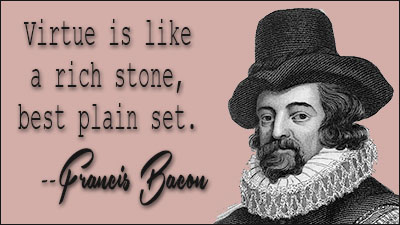FRANCIS BACON QUOTES II
English philosopher (1561-1626)

Notice: Undefined variable: id in /hermes/walnacweb03/walnacweb03ak/b2149/pow.notablequote/htdocs/b/includes/quoter.php on line 25
The stage is more beholding to love than the life of man. For as to the stage, love is ever matter of comedies and now and then of tragedies; but in life it doth much mischief, sometimes like a Siren, sometimes like a Fury.
FRANCIS BACON
Notice: Undefined variable: id in /hermes/walnacweb03/walnacweb03ak/b2149/pow.notablequote/htdocs/b/includes/quoter.php on line 35
Essays
Notice: Undefined variable: id in /hermes/walnacweb03/walnacweb03ak/b2149/pow.notablequote/htdocs/b/includes/quoter.php on line 61
The master of superstition, is the people; and in all superstition, wise men follow fools; and arguments are fitted to practice, in a reversed order.
FRANCIS BACON
"Of Superstition", The Essays or Counsels, Civil and Moral
Men’s weaknesses and faults are best known from their enemies.
FRANCIS BACON
The Advancement of Learning
Knowledge is power.
FRANCIS BACON
Meditationes Sacrae
Human knowledge and human power meet in one; for where the cause is not known the effect cannot be produced.
FRANCIS BACON
Novum Organum
Hope is a good breakfast, but it is a bad supper.
FRANCIS BACON
Apothegms
But as Cicero, when he setteth down an idea of a perfect orator, doth not mean that every pleader should be such; and so likewise, when a prince or a courtier hath been described by such as have handled those subjects, the mould hath used to be made according to the perfection of the art, and not according to common practice: so I understand it, that it ought to be done in the description of a politic man, I mean politic for his own fortune.
FRANCIS BACON
The Advancement of Learning
A man shall see faces, that if you examine them part by part, you shall find never a good; and yet altogether do well. If it be true that the principal part of beauty is in decent motion, certainly it is no marvel, though persons in years seem many times more amiable; pulchrorum autumnus pulcher; for no youth can be comely but by pardon, and considering the youth, as to make up the comeliness.
FRANCIS BACON
"Of Beauty", The Essays or Counsels, Civil and Moral
Who then to frail mortality shall trust
But limns the water, or but writes in dust.
FRANCIS BACON
The World
This variable composition of man’s body hath made it as an instrument easy to distemper; and, therefore, the poets did well to conjoin music and medicine in Apollo, because the office of medicine is but to tune this curious harp of man’s body and to reduce it to harmony.
FRANCIS BACON
The Advancement of Learning
The desire of power in excess caused the angels to fall; the desire of knowledge in excess caused man to fall.
FRANCIS BACON
"Of Goodness and Goodness in Nature," Essays
So in most things men are ready to abuse themselves in thinking the greatest means to be best, when it should be the fittest.
FRANCIS BACON
The Advancement of Learning
Medicine is a science which hath been (as we have said) more professed than laboured, and yet more laboured than advanced; the labour having been, in my judgment, rather in circle than in progression.
FRANCIS BACON
The Advancement of Learning
It would be an unsound fancy and self-contradictory to expect that things which have never yet been done can be done except by means which have never yet been tried.
FRANCIS BACON
Novum Organum
If a man look sharply and attentively, he shall see Fortune; for though she is blind, she is not invisible.
FRANCIS BACON
"Of Fortune," Essays
Generally, youth is like the first cogitations, not so wise as the second. For there is a youth in thoughts, as well as in ages. And yet the invention of young men, is more lively than that of old; and imaginations stream into their minds better, and, as it were, more divinely.
FRANCIS BACON
"Of Youth and Age", Essays; or Counsels Civil and Moral
Fortune is like the market, where many times, if you can stay a little, the price will fall.
FRANCIS BACON
"Of Delays," Essays
Fame is like a river, that beareth up things light and swollen, and drowns things weighty and solid.
FRANCIS BACON
Essays
Examine thy customs of diet, sleep, exercise, apparel, and the like; and try, in any thing thou shalt judge hurtful, to discontinue it, by little and little; but so, as if thou dost find any inconvenience by the change, thou come back to it again: for it is hard to distinguish that which is generally held good and wholesome, from that which is good particularly, and fit for thine own body.
FRANCIS BACON
"Of Regiment Of Health", The Essays or Counsels, Civil and Moral
Death is a friend of ours; and he that is not ready to entertain him is not at home.
FRANCIS BACON
"An Essay on Death," The Remaines of the Right Honourable Francis Lord Verulam (Bacon's authorship of this essay has been disputed by some historians.)